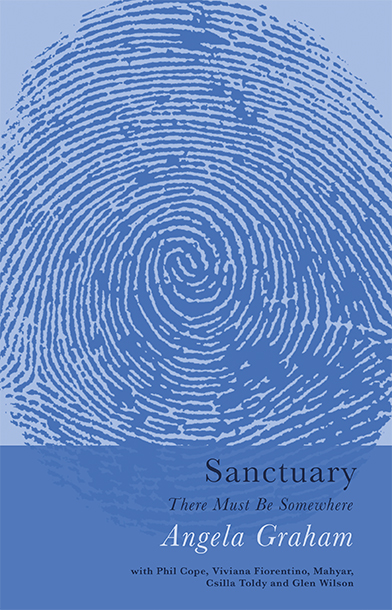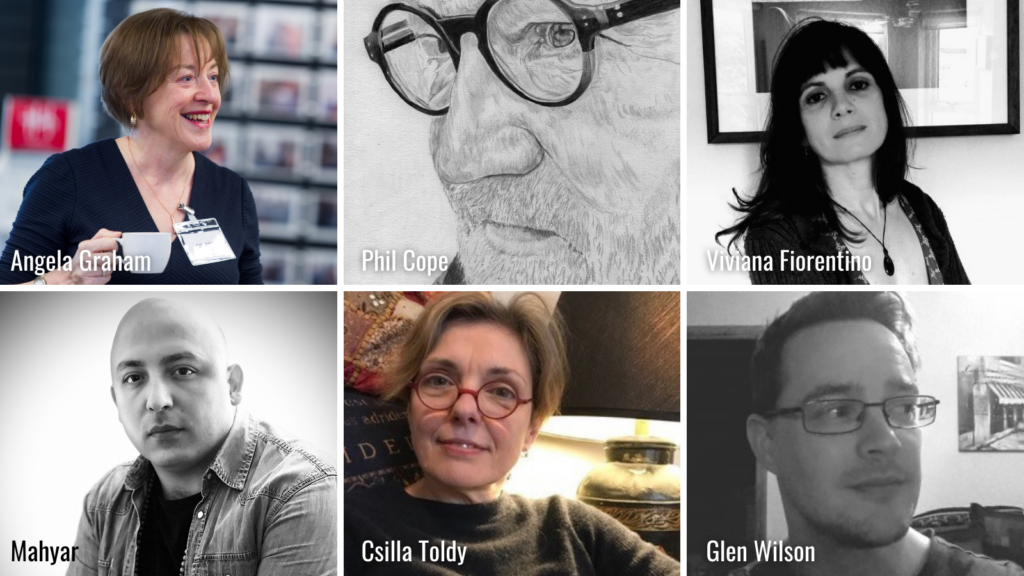Angela Graham considers the genesis of her new collection of poetry and the link between poetry and sanctuary.
Wales: Nation of Sanctuary. It’s an inspiring aspiration and commitment. However, as I was creating my new collection of poetry Sanctuary: There Must Be Somewhere, published by Seren Books, I realised that my notion of sanctuary was inadequate.
I had allowed myself to think of Wales, and the UK, only as the goal of sanctuary-seekers, as ‘receiving’ nations who provide refuge. I have come to understand that we are all seekers of sanctuary. The world looks different from that perspective.
I am not making a crass comparison between the average Welsh citizen and the plight of desperate people who are forced to pull up their roots and search for somewhere safe to live. I am pointing to something at a shared and deeper level.
Sanctuary declares that beyond a certain ‘line in the sand’ law and justice must give way to mercy
Sanctuary is a human need. It has a recorded history of nearly three thousand years across many cultures. It has to do with setting a limit on power. Sanctuary declares that beyond a certain ‘line in the sand’ law and justice must give way to mercy; to the need for respite.
We have the resources to offer physical sanctuary to those arriving from places in crisis but rather than seeing them as ‘not like us’, considering sanctuary’s depths reveals that our profoundest needs are similar and that, in a providential reversal, the ‘needy’ have the capacity to offer sanctuary to us. The final poem in the book addresses this extraordinary potential:
Home
As I spoke, I realised that he was listening,
that he had opened up some room inside himself
and there was the hallway beckoning me
towards a door, giving onto a sunlit space
that I could enter, my burden in my arms,
and when I’d placed it on his table
we would, together, loosen its bonds,
consider it… quietly.
What we were talking of I don’t remember now
but that he, on his threshold, stood aside to let me in
— that has never left me. He gave me living proof
that this is how we’re meant to be,
capable of choosing to welcome someone in
and that when that person does the same for us
he is our shelter. We are a home for one another.
And this holds true for everyone.
When I began the process of creating the collection I thought of sanctuary as a place. I ended it understanding that sanctuary is something I can aim to be – a person of sanctuary.
Discussions and debates that drive Wales forward.
Join Wales’ leading independent think tank.
The poem that gives the collection its subtitle takes a hard look at the likelihood of finding sanctuary in our society. Sentimentality is out. We have made a bad job of many things. What remains?
There Must Be Somewhere
that is safe from violation.
Childhood. Being son, or daughter. Pregnancy,
old age, infirmity – none of these.
The corridors of hospitals, asylums, refuges
– places we thought were sacrosanct –
are roamed by predators
and though the innocent fox has his earth
and the birds of the air their nests, we are un-homing
ourselves and ravaging even our own minds.
Yet we hope for sanctuary, a nook out of the wind,
shelter in the cwtch of someone’s overcoat,
a harbouring gaze, if nothing else.
I often think about that song The Parting Glass.
The last toast raised, the one who has to leave
steps out, across the threshold, into the turbulent night;
that brilliant room
(where the worst of him was known, forgiven, shouldered)
remains his compass, carried always.
Nowhere is safe. We know that.
And we know that somewhere is
because we’ve been there, irrefutably,
and we can find it,
open its door,
return to the welcome that we left.
In designing the collection I wanted it to embody the hosting aspect of sanctuary so I looked for two poets in Wales and two in Northern Ireland (since I live in both places) who have expertise in some aspect of sanctuary. In Northern Ireland I found Csilla Toldy, a film maker and writer who fled Communist Hungary for life in the ‘free’ West; and Viviana Fiorentino, an economic migrant from Italy who is a novelist, poet and academic who campaigns on behalf of prisoners of conscience and migrants. In Wales I found Phil Cope, an expert on the holy wells of the British Isles and Mahyar, an Iranian who has made Wales his home.

Seren
Angela Graham
I asked each of them to write a poem collaboratively with me. This is very different to contributing a poem of one’s own. It requires that two poets enter each other’s ‘sanctuary’, the inner creative space, the ‘holy of holies’. It requires courage and trust. The four resulting poems extend the collection’s depth and reach far beyond what I would have managed on my own. In addition, my mentor, poet Glen Wilson, contributes a poem of his own on migration into the USA.
We are also experiencing a sanctuary ‘moment’ because of the pandemic. Early on in the Covid outbreak, poet Michael Rosen spent 48 days in hospital, 40 of them in a coma. He recently wrote:
‘We are chewing over several levels of trauma at the same time: personal, social, national and possibly global… the burden of the national and social trauma is being carried by us and our families and personal relationships.’
He laments the lack of a ‘national moment… that official gathering where we all reflect at the same time on what has happened to us.’ A poem can be a moment of shared reflection between poet and reader.
Since The Evacuations From Kabul
Must sanctuary now imply its opposite:
the open sewer beside the airport gate;
the foreigners’ pragmatic rush to quit
(the loophole shrunk by each departing state);
the frenzied sea of documents, held high
to prove the right to have a promise kept?
A worthless currency, they prove a lie
— expedient, well-meant, easily side-stepped —
Is there a scathing truth we have to face,
that outside every sanctuary there’s a hell
where howling crowds who crave the sacred space
clamour to join th saved? Prison cell
and sanctuary – keys turn, locks click, bolts slide
but only one can open from inside.
Our bilingual Sanctuary session at the Cardiff Poetry Festival: Noddfa A Sut Mae Byw Ynddi – Sanctuary and How To Live It (11.00 am Sunday 31st July, The Atrium, USW) will offer poems from five panellists: Gwyneth Lewis, a former National Poet of Wales; Rev Aled Edwards, an architect of the Nation of Sanctuary concept; Dylan Moore, author of Many Rivers To Cross, a novel about refugees and their Welsh hosts; Joseph Gnagbo a linguist, trainee teacher of Welsh and former refugee from the Ivory Coast; and myself.
Angela acknowledges the support of The National Lottery through the Arts Council of Northern Ireland.
This article is part of our summer reads series.
All articles published on the welsh agenda are subject to IWA’s disclaimer.





